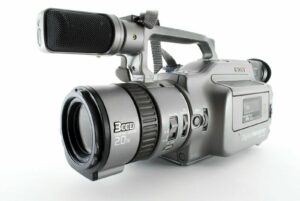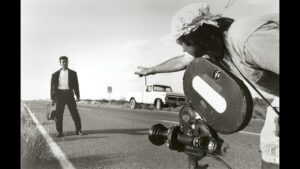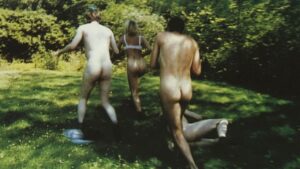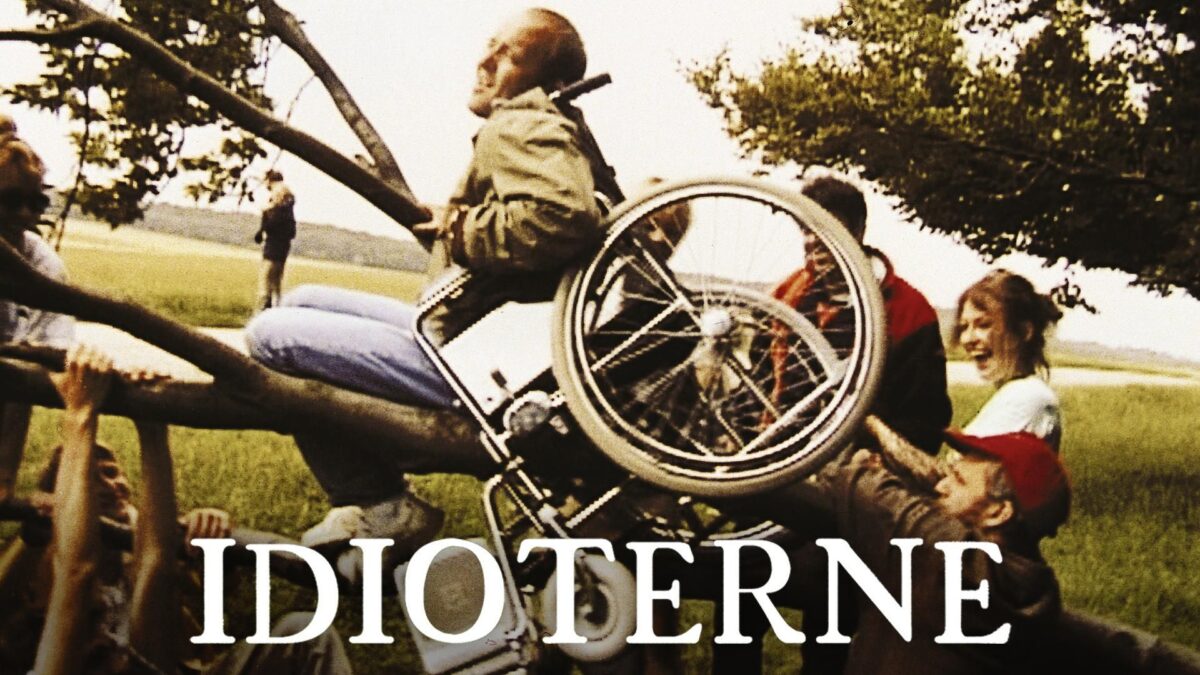Dogma 95 was a manifesto signed and published by Danish film directors Thomas Vinterberg and Lars Von Trier in 1995. This manifesto consists of ten rules to be followed, the so-called vows of chastity, which should serve as a guide for the production of future films. This should lead to the renunciation of various accommodations or production conventions in the making of films on the part of the filmmakers, such as
«[…] 3. it is only allowed to shoot with one camera. […] 5. Optical manipulation is forbidden, as is the use of filters. […] 6. The film must not contain any superficial action. (Murder, weapons, etc. are not allowed.) [sic!] 7. temporal or geographical distortion is forbidden. (This means that the movie must take place in the here and now.) [sic!] […] 9. The film format must be 35mm Academy».
This is a counter-movement to the auteur theory of the 60s. Many films made according to these Dogma 95 rules violate some of these vows of chastity, which makes the films seem even more ironic.
Under these -and other- circumstances, the movie “Idiots” was produced by Lars Von Trier (aforementioned founder of the Dogma 95 movement), which is about a commune of young adults who prank other people by pretending to be disabled. The plot begins with a middle-aged woman who joins them to put a terrible event from her private life behind her.
The movie «Idiots» was filmed in a very atypical format for movies of that time. Although the film was later transferred to 35mm for theatrical release, it was shot entirely on a Sony DCR-VX1000 videocamera. At the time, this recording device was often used by skateboarders, but was originally designed by Sony for the broadcast industry, giving the film a documentary feel unlike most movies shot on roll film.

But was this documentary effect only due to the director’s choice of camera? What can we say about the other conditions of Dogma 95? What influence did they have on the finished film?
As Marshall Mcluhan once wrote, «the medium is the message», it would make more sense to say the following about the movie «Idioten» (original title in Danish: Idioterne): «Dogma 95 is the movie». The rules under which Lars von Trier made «Idiots» have a certain relevance that we cannot neglect. Therefore, in this short essay, we will examine to what extent the observance (or non-observance) of the Dogma criteria correlates with the «documentary» effect of the film Idioterne (1998).
- THE VIDEO CAMERA FORMAT
In terms of filmmaking in the 90s, video cameras were exceptionally used for very cheap or amateurish film productions (if at all!) because filmmakers often preferred cheaper roll film formats such as 16 mm or even 8 mm, such as Paul Thomas Anderson, Wes Craven, Richard Linklater and Kevin Smith for their very first films. As a result, this video camera format was used more for private recordings of weddings, birthdays or first communions than for «professional» work, which was often shot on roll film. This is why the image quality of «Idiots» has more in common with a birthday video than with a Hollywood movie from the 90s. This is the reason why the film has a realistic effect similar to a documentary, in complete contrast to the highly aesthetic look of a big-budget movie. Even the film’s editor, Molly Malene Stensgaard, noticed this.

At this point, the question arises as to how LVT (an abbreviation of the director’s name «Idiots») justified using the video camera format when the Dogma 95 rules explicitly stated that the film format had to be Academy 35mm.
The question has not been conclusively answered, but in an interview years later, he confessed the following:
«The DOGMA rules said that the movies should only be shot on film, and I thought we should stick to that. Yes, actually it only says that the film format should be 35mm Academy. […] In retrospect, I can say that I don’t think my decision to shoot on video was particularly honorable.
- TEMPORAL AND LOCAL DISTORTIONS
The Dogma 95 rules were partly written and signed as a counter-movement against the so-called cinema of illusion, ergo films that smothered any bit of truth. One can assume that this is why Thomas Vinterberg and LVT placed great emphasis on the «here and now», and why the directors refrained from using creative license such as flashbacks or flash-forwards in their storytelling. And this is explicitly mentioned in the seventh rule of Dogma 95, which reads as follows:
«7. Temporal and geographical distortions are forbidden. (That is, the movie takes place in the here and now.) [sic!]
Nevertheless, «Idiots» contains some interview scenes (in which the characters talk about their past experiences in the commune) that should have taken place in the future of the story . The reason why these interviews take place in the film is never explained or mentioned. This is a recurring device that is, of course, often present in documentaries or reportages. Paradoxically, the non-observance of the seventh rule contributed to the realism of the film by giving it a documentary look.

- THE STAND-INS AND THE COLORING
Aside from the two violations mentioned above, LVT enforced the Dogma 95 rules as strictly as possible. An example of this is LVT’s outrage when he found out that his producer, Vibeke Windeløv, was going to have the finished film colorized by a film processing lab.
Nevertheless, he used stand-ins (i.e., stuntmen or stand-in actors) from the pornographic film industry for the famous sex orgy scene (image 5), in partial violation of the sixth rule, which forbade any kind of superficial action. Yet this disregard paradoxically lent the film even more realism, since very explicit sex scenes involving penetration are not common in feature films, and widened the distance between «Idiots» and a standard fiction film.

- THE FAILED ANTI-AUTHOR STATEMENT
Although the Dogma 95 manifesto took a very clear position against the authorship of directors on their own films, it should be noted that Thomas Vinterberg and LVT had (intentionally?) completely turned the tables on this aspect, because LVT already had a medium-long professional career behind him and had enjoyed the attention of the press for years; and also because Thomas Vinterberg had gained the recognition of the international press through his participation in the Dogma 95 project.
This was even often mocked in public with the appearance of fake manifestos intended as a parody against Dogma 95. One of these manifestos contained the following rule
«6. No one in the room may mention the director’s name, but he may be referred to as ‘the person whose name was all over the press last month and who won the Special Prize at Cannes’! (Anon 1998)».
- CONCLUSION
The use of video cameras – already a violation of the rules – contributed greatly to the documentary aesthetic of the film. It is clear that without an implicit disregard for the rules, LVT would not have achieved the documentary effect. In my opinion, paradoxically, not only the observance but also the non-observance of the Dogma 95 rules played a decisive role in giving the film «Idiots» a documentary effect. Strict adherence to the rules was not even practiced by the movement’s own founders. In the Dogma 95 movement, there seemed to be a quasi-religious relationship between the directors and the rules. It is no wonder that many directors confessed the sins they had committed in the production of their respective films. LVT commented on this point by comparing the Dogma 95 rules to one of the Ten Commandments:
«Some rules are difficult to follow, like the commandment: ‘You shall love your neighbor as yourself.
Finally, I would like to mention one last quote from LVT that should sum up my whole conclusion:
«We are all sinners now, because it is impossible to follow the rules. The optimal DOGMA movie has not yet been made and probably never will be.
- SOURCES
Hallberg, Jana; Wewerka, Alexander (Hgg.): DOGMA 95. Zwischen Kontrolle und Chaos. Berlin 2001. S. 12-182.
McLuhan, Marshall: Understanding Media. The Extensions of Man. MIT Press. Cambridge 1994. S. 7.
Hjort, Mette; MacKenzie, Scott (Hgg.): PURITY AND PROVOCATION. Dogma 95. London 2003. S. 98-141.
Anon: The Idiots Technical Specifications. In: IMDB. o.J. https://www.imdb.com/title/tt0154421/technical?ref_=tt_dt_spec (last access: 08.02.2021).
Anon: The Consumer Electronics Hall of Fame. Sony. In: IEEE SPECTRUM. 03.01.2019. https://spectrum.ieee.org/consumer-electronics/gadgets/the-consumer-electronics-hall-of-fame-sony-dcrvx1000 (last access: 08.02.2021).
Anon: DCR-VX1000. In: Sony. 13.08.2020. https://www.sony.net/SonyInfo/design/gallery/DCR-VX1000/ (last access: 08.02.2021).
Petersen, Erik Lennart: TILBAGEBLIK PÅ IDIOTERNE. In: Youtube. 21.03.2018. https://www.youtube.com/watch?v=YKpM2MvA6sY&t=1336s (last access: 08.02.2021).
Petersen, Erik Lennart: DEN IDIOTISKE FILTERSÆTNING. In: Youtube. 22.03.2018. https://www.youtube.com/watch?v=uNFrM6iwLg8 (last access: 08.02.2021).
